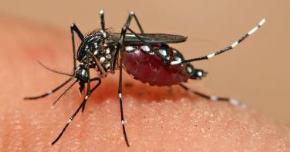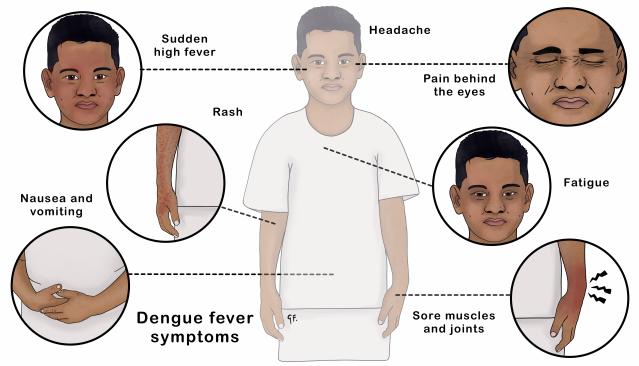Key points about dengue fever
- you can get dengue fever from the bite of an infected mosquito
- many tamariki (children) who have dengue fever may have no symptoms, or they may just have a mild illness with a fever
- some tamariki may get a more severe type of dengue fever and get very sick
- the best way to avoid dengue fever is to prevent mosquito bites
How do you get dengue fever?
Your child can catch dengue fever by being bitten by an infected Aedes mosquitoes.
Photo of the Aedes mosquito that causes dengue fever

Where you can catch it
Dengue fever is not common in Aotearoa New Zealand.
It is very common in other more tropical parts of the world such as:
- the Pacific Islands
- parts of Asia and Africa
- Central and South America
- the Caribbean
- some southern areas of North America
There are different types of dengue fever
There are different types of the virus that cause dengue fever. This means your child can get dengue fever more than once if they get a different type. This is because infection by one type doesn't protect against the other types.
Dengue fever doesn't spread between people
You can't catch dengue fever from another person. If your child has returned to New Zealand with dengue fever, they cannot pass it on to others in the family.
How can I avoid my child getting dengue fever?
There is no vaccine to prevent dengue fever.
The best way to avoid dengue fever is to prevent mosquito bites. Protect your child from mosquito bites day and night.
In this Ministry of Health video, Dr Laupepa Va'a talks about how people travelling overseas can avoid being bitten by mosquitoes that might carry diseases.
Follow along using the transcript on YouTube.
Indoors
Stay in places with screens on doors and windows if possible.
Use a mosquito net over your child's bed or cot whenever they sleep - for daytime and nighttime sleeps. New bed nets often have insecticide already on the net, but if not, you can spray the net with insecticide.
Use air conditioning or fans if available. Close all windows and doors. This is very effective at keeping mosquitoes out of the room.
Use insect sprays indoors when mosquitos are around - even if you can't see them.
Use mosquito coils.
Outdoors
Clothing
Make sure your child wears socks and shoes rather than sandals, jandals or bare feet.
Dress your child in light-coloured, loose fitting clothing such as long-sleeved shirts, long pants and hats.
Insect repellent
Put insect repellent containing up to 30% DEET (diethyltoluamide) on your child. Higher concentrations are no more effective and can be harmful.
When using sunscreen, put repellent on after the sunscreen.
Spray repellent on clothes.
Camping
Use zip-up screens on tents.
Avoiding some areas
Stay away from places where mosquitoes are most active or breeding - for example, stagnant water.
Check the latest information on outbreaks before you travel
Visit the Safe Travel website before you travel. It provides information about the latest outbreaks.
Check out how to avoid diseases spread by mosquitoes while in the Pacific (PDF, 303KB). (Auckland Regional Public Health Service - Ratonga Hauora-ā-Iwi ō Tāmaki Makaurau website).
What are the symptoms of dengue fever ?
Your child can develop symptoms 3 to 14 days after being bitten by an infected mosquito.

Dengue fever symptoms can last up to 10 days and may include:
- a sudden high fever
- an intense headache
- pain behind the eyes
- muscle and joint pain
- feeling very tired
- nausea and vomiting
- a skin rash
Many tamariki who have dengue fever may have no symptoms, or they may just have a mild illness with a fever.
How is dengue fever diagnosed?
Your health professional will ask about your child's symptoms and examine your child. If your doctor suspects dengue fever, your child will need a blood test.
What is the treatment for dengue fever?
There is no specific treatment for dengue fever.
Caring for your child at home
Make sure your child drinks plenty of fluids and get plenty of rest.
Give your child paracetamol to manage fever and pain. You must follow the dosage instructions on the bottle - it is dangerous to give more than the recommended dose.
Do not use aspirin or ibuprofen tablets (and other non-steroidal anti-inflammatory tablets). They can increase the risk of bleeding from dengue infection - speak to your pharmacist or health professional first.
What is severe dengue fever?
People with severe dengue fever need hospital treatment because the disease is life-threatening.
Symptoms of dengue fever usually last up to 10 days.
2 to 5 days after dengue fever symptoms have begun, some people may get severe dengue fever. They get worse very quickly even though their fever goes down.
Your child is more at risk of severe dengue fever if they have had dengue fever before.
People with severe dengue fever need hospital treatment because the disease can be life-threatening.
Warning signs of severe dengue fever include:
- severe tummy pain
- vomiting which doesn't get better
- bleeding gums
- vomiting blood
- rapid breathing
- extreme tiredness
- restlessness
Who should I contact if I think my child might have dengue fever?
If your child is feeling sick during your trip or in the first 3 weeks after you return home, seek medical advice.
If you are back in New Zealand, you can call Healthline for free on 0800 611 116, or see a health professional. Make sure you tell them about your travel.
Acknowledgements
Illustrations by Dr Greta File. Property of KidsHealth.
